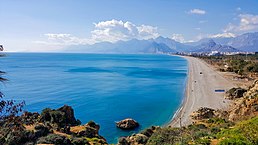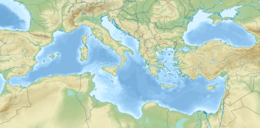Antalya | |
|---|---|
| Nickname(s): Capital of Tourism (Turkish: Turizmin Başkenti) | |
| Coordinates: 36°53′15″N 30°42′27″E / 36.8874°N 30.7075°E | |
| Country | |
| Region | Mediterranean |
| Province | Antalya |
| Government | |
| • Type | Metropolitan municipality |
| • Mayor | Muhittin Böcek (CHP) |
| Area | |
| 20,591 km2 (7,950 sq mi) | |
| • Urban | 1,417 km2 (547 sq mi) |
| Elevation | 30 m (100 ft) |
| Population (2019)[1] | |
| • Urban | 1,344,000 |
| • Metro | 2,619,832 |
| • Metro density | 122/km2 (320/sq mi) |
| Demonym | Antalyalı |
| GDP | |
| • Metropolitan municipality | ₺ 506 billion US$ 31 billion (2022) |
| • Per capita | ₺ 192,980 US$ 11,643 (2022) |
| Time zone | UTC+3 (TRT) |
| Postal code | 07010 to 07320 |
| Area code | (+90) 242 |
| Vehicle registration | 07 |
| Website | www www |
Antalya[a] is the fifth-most populous city in Turkey and the capital of Antalya Province.[3] Recognized as the "capital of tourism" in Turkey and a pivotal part of the Turkish Riviera,[4] Antalya sits on Anatolia's southwest coast, flanked by the Taurus Mountains. With over 2.6 million people in its metropolitan area, it is the largest city in Turkey's Mediterranean Region, situated along the Mediterranean Sea.[5][6][7]
The city was formerly known as Attalia and was founded in around 200 BC by King Attalus II of Pergamon. Attalia was soon conquered by the Romans. Roman rule saw the city thrive, including the construction of several new monuments, such as Hadrian's Gate, and the flourishing of nearby ancient cities such as Patara, Xanthos and Myra in the Lycia region; Perga, Aspendos and Side in Pamphylia; and Sagalassos, Antioch and Termessos in Pisidia. These cities were already significant centers before Roman influence. Antalya has changed hands several times, including to the Seljuk Empire in 1207 and an expanding Ottoman Empire in 1391.[8] Ottoman rule brought relative peace and stability for the next five hundred years. The city was occupied by Italy for three years in the aftermath of World War I, but was recaptured by a newly independent Turkey in the Turkish War of Independence.
While the city itself only has modest elevation changes, Antalya has high mountains in all directions to its interior. With moisture being trapped, the local climate thus has high winter rainfall, while the interior bay setting result in very hot summers for a coastal city.
The city is Turkey's biggest international sea resort on the Turkish Riviera. Large-scale development and governmental funding has made it a prime destination for tourists. Antalya is currently the fourth-most visited city in the world, trailing behind only Istanbul, London, and Dubai, attracting more than 16.5 million foreign visitors in 2023.[9][10]
- ^ "Turkey: Major cities and provinces". citypopulation.de. Retrieved 13 December 2020.
- ^ "Statistics by Theme > National Accounts > Regional Accounts". www.turkstat.gov.tr. Retrieved 11 May 2023.
- ^ "Arşivlenmiş kopya". 10 March 2018. Archived from the original on 12 June 2018. Retrieved 10 June 2018.
- ^ "Antalya: Capital of Turkish tourism, world's open-air museum". Daily Sabah. 16 August 2020.
- ^ "Turkey: Provinces and Major Cities - Population Statistics, Maps, Charts, Weather and Web Information".
- ^ 2011 Census, Turkish Statistical Institute (Büyükşehir belediyeleri ve bağlı belediyelerin nüfusları) – 2011 Archived 19 October 2012 at the Wayback Machine
- ^ "2011". Citypopulation.de. Retrieved 24 June 2014.
- ^ "History of Antalya". Lonely Planet.
- ^ Popova, Nadejda (11 December 2023). "2023's Top 100 City Destinations Ranking: Triumphs and Turmoil Uncovered". Euromonitor International. Retrieved 18 December 2023.
- ^ Leasca, Stacey (6 February 2024). "Two of the most-visited cities in the world are in Turkey - this one is the unsung hero". BBC. Archived from the original on 26 February 2024. Retrieved 27 March 2024.
Cite error: There are <ref group=lower-alpha> tags or {{efn}} templates on this page, but the references will not show without a {{reflist|group=lower-alpha}} template or {{notelist}} template (see the help page).









